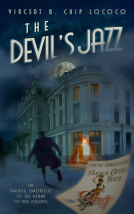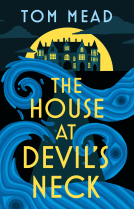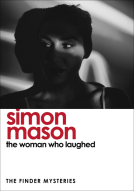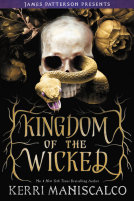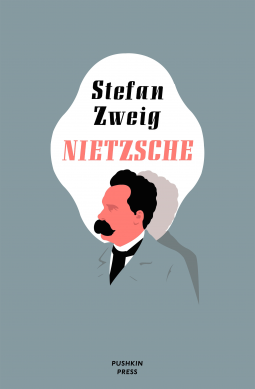
Nietzsche
by Stefan Zweig
This title was previously available on NetGalley and is now archived.
Send NetGalley books directly to your Kindle or Kindle app
1
To read on a Kindle or Kindle app, please add kindle@netgalley.com as an approved email address to receive files in your Amazon account. Click here for step-by-step instructions.
2
Also find your Kindle email address within your Amazon account, and enter it here.
Pub Date Jan 19 2021 | Archive Date Nov 26 2020
Talking about this book? Use #Nietzsche #NetGalley. More hashtag tips!
Description
In this vivid biography, Zweig eschews traditional academic discussion and focuses on Nietzsche's habits, passions and obsessions. This work, concentrating on the man rather than the work, on the tragedy of his existence and his apartness from the world in which he moved in enforced isolation, is a tour de force, drawing the reader inexorably into Nietzsche's tragic trajectory.
Illustrated with numerous photographs relating to Nietzsche and his European locations, this superb translation by Will Stone is essential reading for anyone interested in Nietzsche, Zweig, first-class biographies and philosophy.
Advance Praise
'Zweig's accumulated historical and cultural studies [are] almost too impressive to take in.’ — Clive James
‘Zweig is the most adult of writers: civilised, urbane, but never jaded or cynical; a realist who none the less believe in the possibility – the necessity – of empathy.’ — Independent
‘Zweig… deserves to be famous again, and for good.’ — TLS
Available Editions
| EDITION | Other Format |
| ISBN | 9781782276364 |
| PRICE | $16.95 (USD) |
| PAGES | 112 |
Featured Reviews
A scintillating biographical study of one of the greatest philosophers of the nineteenth century, by one of the bestselling writers of the twentieth. In this vivid biography, Zweig eschews traditional academic discussion and focuses on Nietzsche's habits, passions and obsessions. This work, concentrating on the man rather than the work, on the tragedy of his existence and his apartness from the world in which he moved in enforced isolation, is a tour de force, drawing the reader inexorably into Nietzsche's tragic trajectory.
Illustrated with numerous photographs relating to Nietzsche and his European locations, this superb translation by Will Stone is essential reading for anyone interested in Nietzsche, Zweig, first-class biographies and philosophy. It's accessible, captivating and eminently readable, but what makes Zweig’s memoir tower head and shoulders above the rest in a sea of Nietzsche books is the nuance and minute, intricate detail, as well as the unbridled passion, with which it has been written. An exhaustive account of a philosopher who had a substantial posthumous impact across Western societies. Highly recommended. Many thanks to Pushkin for an ARC.
 Anat L, Reviewer
Anat L, Reviewer
Zweig on Nietzsche like it says in the forward is not so much a biography as a hagiography, a gushing portrait of a man he greatly admires. The book is actually part of a larger work Hölderlin, Kleist, and Nietzsche: The Struggle with the Daemon. Zweig romanticizes the struggle with the Daemon, the so called inner creative force, as “a tragedy of the spirit", as well as a "work of dramatic art.” To quote Zweig "Nietzsche practised philosophy like art, and like the artist he did not search for results, something in cold definition, but a style: ‘the great style of morality’, and like the artist he experiences all those quiverings of sudden inspiration This is perhaps why labelling Nietzsche a philosopher in the first place is a mistake, that is to say a friend of Sophia, of wisdom."
This is a poetical endeavor to canonize Nietzsche as He is portrayed as a very passionate man at war with himself and in constant search for more knowledge and intellectual challenges but also very solitary vehement and impatient. He struggles constantly with his over active mind and nerves becoming more overheated and chaotic as times go by. As a young man while his friends were carousing and indulging themselves, Nietzsche was already a professor in the prestigious university of Basel. At thirty he abandons his chair at Basel. Zweig often draws comparisons between Nietzsche Dostoyevsky and Goethe. While other thinkers like Goethe and Schiller became more conventional and Bourgeoisie, Nietzsche moves away from stability severing all of his former ties:
"Nietzsche had no desire to find happiness but only to be true. He did not seek rest (like nine-tenths of philosophers), but rather in the position of slave and server of the demon, the final superlative to express all excitations and all movements. Every struggle for the inaccessible acquires the character of heroism and all heroism must end in that most sacramental of all consequences: downfall. Inevitably this virtual fanaticism for integrity,"
I am very impressed with the beautiful translation. There were paragraphs I would have liked to listened to being read aloud because the language and cadence were so beautiful. Reading Zweig on other artists and thinkers reveals a lot about Zweig himself and what he aspired to. What he sees as escaping the subjugation and releasing the primordial artistic freedom while embracing the Dionysian spirit that gladly accepts excesses without fearing the danger.
Many thanks to NetGalley and Pushkin Press for an e-arc in exchange for an honest review!
#Nietzsche #NetGalley
 Richard M, Reviewer
Richard M, Reviewer
Stefan Zweig's biography of Nietzsche is electric. The energetic pace of his prose matches the mad dash of the philosopher as he flees his teaching position in Basel, his friends and companions, in a mad dash from one European city to another striving to complete his philosophical oeuvre.
Zweig's biography of Nietzsche is already legendary. No less an authority than Walter Kauffman cites a page-long quotation from Zweig in the translator's introduction to Thus Spake Zarathustra. Yet English language translations of Zweig's biography have been inadequate, obscure, and hard to find.
Because of this, the current translation by Will Stone published by Puskin Press, is particularly welcome. Pushkin has already published several of Stone's translations of Zweig's works, including his biography of Montaigne, and his Messages from a Lost World.
The English speaking world already has many good biographies of Nietzsche. Kaag's Hiking with Nietzsche and Prideaux's I am Dynamite are both very readable books on Nietzsche that have appeared within the last few years. Nietzsche and his published work are complicated enough to merit and require many explainers. But Zweig's portrayal of Nietzsche captures the man's suffering and sadness in a way that I hadn't encountered before. Never having read earlier translations, or the original German, I can't compare the current translation to these others. But it's truly remarkable for an edition of a 95-year-old biography of a philosopher who died 120 years ago to feel this timely, this modern, this essential, and this hard to put down.
Thanks to NetGalley and Pushkin Press for an advance copy in exchange for an honest review.
‘They will understand me after the next European war.’
True to his words, this prophetic prediction of Nietzsche which is one of his last pieces of writing gives an undeniable truth to 20th century Europe. In this thin book, Stefan Zweig introduces us to Nietzsche The Man, beyond the frequent association of him with his creation der Übermensch in his celebrated work "The Antichrist/Thus Spake Zarathustra". Stefan Zweig presents the life of Nietzsche in this book not as a biography, but rather as a dramatic act in which we witness a work of art and a tragedy of the spirit, two occurrences which gave birth to a man who was fully conscious of his freedom.
Zweig is not busy presenting us with dates and places, but he shows us the thinking process of Nietzsche which in some sense finds parallels to the life of Vincent Van Gogh. Both of them happen to live around the same period of the late 19th century. Both are misunderstood by men of their times, to be thought of as men whose errors are beyond repair. The scarcity of companions and the intense solitude is what drives both men into their creative vigor. As Zweig describes: “For only suffering leads to knowledge. Rude health is hollow and unsuspecting.”
Unlike Nietzsche, Zweig happened to enjoy literary fame during his life. Like the subject of his writing, he was also haunted by a demon which finally led to him taking his own life with his second wife Lotte in 1942. This book was first published in 1925, during the time of the Weimar Republic. As we noticed in the timeline, there are several elements of Nietzsche’s philosophy that are incorporated into Nazi ideology, especially concerning der Übermensch which is aligned with the idea of racial supremacy of the Germans as the Aryans. Zweig writes this book during the time when the appreciation towards Nietzsche was more widespread, which shows the general tendency of his time.
Through this brief dramatic biography, however, Zweig manages to convince us that Nietzsche is a man of no compromise himself. He was the truest skilfully truth seeker, whose only mission is to guide mankind to the truth, in a quasi-prophetic sign. In the search for truth, it cost him friendships, recognitions to his past accomplishments as a professor of philology, and much more so even readerships. Zweig frequently draws a comparison between Goethe and Nietzsche, two men who we could say highly shape the modern thoughts in Germany and Europe. One who looks to the past, and one who looks to the future. One who appreciates the rooted traditions, one who tries to define a new age. Now we could finally appreciate Nietzsche’s thoughts due to his courage to self-publish works that are deemed immoral during his age.
The climax of this book to me is how Zweig employs parataxis in describing the madness state of Nietzsche being during the last days of his life. There are many ways to use parataxis, but it finds no better match rather than the intense solitude of being experienced by Nietzsche just before his death. He died at the turning of the century, not seeing the impacts of his works in the century to come.
Besides the authorship prowess of Zweig as a literary author and his deep research into Nietzsche’s life, there’s also the power of translation by Will Stone in this book. "Der Kampf mit dem Dämon" was first published in English in 1939, just before the outbreak of the Second World War. Retranslation of a great work is something that will give a new life to a book, with the changes in language that we use to communicate at the present time. Certainly, this is a good addition to Nietzsche’s book. Ideas are interesting, but learning about the man behind the ideas himself is way more interesting.
 Reviewer 748224
Reviewer 748224
While I’ve always wanted to, I’ve never read any Nietzsche mainly because I was too intimidated. So I was hoping that by first reading his biography, I’d be better prepared to tackle his work. "I am neither body nor spirit, but rather a third element. I suffer everywhere and for everything... I know life better, because I have so often been at the point of losing it." I will definitely be reading this one again. It’s one of those atmospheric books that’s so beautifully written that you actually learn different things about yourself each time you read it.
Originally published in 1925 by Stefan Zweig, and first translated by Will Stone in 2013, this version by Pushkin Press will be released on Jan 19, 2021. Everything about this book is amazing. Nietzsche’s psyche, constructed of extremes, resembles my favorite artistic technique, chiaroscuro. Even Zweig’s biography of the philosopher employs light and dark in such an artistic way that I literally felt like I was listening to music, not reading.
Zooming out even further, the translator of Zweig’s work is an incredible writer himself, fit for such tragic a subject: “Zweig was no stranger to his own demon, that of angst, periodic bouts of withering depression and a latent suicidal impulse, a preoccupation that perennially leaked into the trajectories of his fictional characters and eventually crystallized in his own demise.”
 Catherine P, Reviewer
Catherine P, Reviewer
Before you even start with Nietzsche, you get to know a little about Stefan Zweig himself and it is definitely worth it.
Then you proceed to a brilliantly written biography of Nietzsche himself. It is very well written and pretty dark in the way. We get to meet other authors such as Goethe. It is interesting how this biography makes you want to read more about other authors mentioned/involved and also read their works if you haven't so far.Very educational and keeps you on your toes.
 Seth F, Reviewer
Seth F, Reviewer
An enthusiastic extended essay, really a paean to Nietzsche. Zweig loves, admires and extols Nietzsche’s brilliance, while sympathizing deeply with the philosophers intense solitude and path to insanity. Very enjoyable for any Nietzsche reader.
 Reviewer 247162
Reviewer 247162
It takes a true lover of Nietzsche to understand him and not misrepresent him. This book gives the best overview of his life and it helps you understand where some of his philosophy was inspired. Both Zweig and Nietzsche are giants.
 Juli R, Reviewer
Juli R, Reviewer
Nietzsche holds a fascinating place for me. On the one hand he feels like one of the Ur-philosophers, equally important to Western or European thought as Plato or Aristotle. On the other hand, in the minds of many, he is linked with fascism and almost aggressive nihilism and pessimism. I went into Nietzsche with the hope that Zweig would bring this mysterious man a little closer to me. Thanks to Pushkin Press and NetGalley for providing me with a copy of this book in exchange for an honest review.
In its introduction, Nietzsche tries to give us an insight into the mind of Zweig, before he attempts the same with Nietzsche. Both haunted and tortured, it makes sense the former would be so in awe of the latter. As the book states, Zweig was filled with respect for many authors, whose heights he never thought he could reach himself. His method was to create trios of authors who, in his eyes, shared a plight, feeling or duty. Nietzsche is part of his 1925 book Der Kampf mit dem Dämon (The Fight with the Demon). He used the conceit of the 'demon' to investigate the lives of Hölderlin, Kleist and Nietzsche and to explain their almost slavish dedication to their craft. Haunted by their own ideas and always driven further, sometimes too far, Zweig sees in them a genius only possible when struggling with this demon. I quickly came to see what Zweig was trying to say with the demon, that in many ways there is no other way to think of this drive that works through people like Nietzsche.
Nietzsche does not take an academic approach to its biographical subject. There are hardly any dates, there is no true chronological cohesion. There is also no grand overview of his philosophical ideas and their development. It almost seems as if this isn't a biography of a person and their accomplishments but rather a biography of a spirit, a soul. Although Zweig pays quite a bit of attention to Nietzsche's physical ailments, this is all in an attempt to explain his curious and fascinating mind. It is his mind that matters, its loneliness, its determination, its perseverance, its hardness. There will be moments of sheer grandeur in which Nietzsche seems godlike and there will be moments in which Nietzsche is nothing but a husk of a man. Zweig, himself a rather tragic figure, would never compare himself to Nietzsche but through his writing we can see a likeness of spirit, a tragic awareness that the world they knew needed to change. Nietzsche will not make you understand the philosopher, but it will give you an insight into his time and into his mind.
Zweig's Nietzsche is a beautiful time piece, a real treasure of the early 20th century.Zweig is a highly dramatic writer and I don't mean that disparagingly. There is a high pathos to his writing, a deep empathy with an embattled soul, a strong identification with Nietzsche's torturous will. His prose soars frequently and is highly literary. Again, not an academic or even factual biography. This is almost an ode and it is beautiful when read out loud. If you're willing to entertain the purpleness of the prose, this is a beautiful read. If you really want to just get to the point, Zweig is not the author for you. Honest praise also needs to go to Will Stone, whose translation is utterly beautiful. He manages to maintain the lyricism of Zweig's writing, its rhythm and energy, perfectly. A too-heavy translation would bring the reading experience to a complete halt, but Stone allows its melodic nature to shine through.
Stefan Zweig's Nietzsche is a beautiful book exploring the spirit of one of the pillars of Western philosophy. Whether you agree with his ideas or not, Nietzsche will give you a new insight into this much-debated man, but only if you like lofty prose.
 Tracey E, Librarian
Tracey E, Librarian
A small yet powerful piece of intellectually-challenging writing. In Zweig’s (translated) words, the author was “endeavouring to present his life not as biography, but as a dramatic act, a work of art and a tragedy of the spirit”. Clearly he felt a great deal for his subject and thrusts an alternative look into the constantly metamorphosing mind-set of the much-criticised philosopher. I commend the translator on a masterful display of work. I struggled somewhat and lost count of the number of times I had to resort to a dictionary, but I finished the book wanting to learn more of Nietzsche’s life and writings so from that perspective alone it was a successful read.
Readers who liked this book also liked:
Keith Martin; Konstantinos Mersinas; Guido Schmitz; Jassim Happa
Business, Leadership, Finance, Computers & Technology, Reference
Vincent B. "Chip" LoCoco
Historical Fiction, Horror, Mystery & Thrillers











